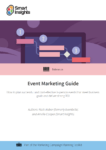In this digital era we live in, the integration of live events and social media has proven to be a marketing strategy with high ROI
The events industry generates $ 1.5 trillion annually around the globe. In this digital era we live in, the integration of live events and social media has proven to be a marketing strategy with high ROI.
If digital was a threat to physical experiences a few years ago, they are complementary now. To better take advantage of this innovative landscape of data analytics, enhanced immersive experiences and growth opportunities, marketing activations are on their way to becoming fully physical and digital at the same.
In other words, they’re combining best practices and optimizations of digital transformation and in-person experiences.
What are live events and social media in the core of marketing strategies for 2020?

New business, customer loyalty, brand engagement, networking and more business
Regardless of the products on display, event planning is the main strategy to position the brand and customers at the center of their businesses, providing a conducive environment for interactions.

After all, in times of crisis or prosperity, people will still have the basic need to meet and share experiences - and these experiences should turn into business opportunities.
At each and every stage of an event, social media is an immense help. On the latest Corporate Event Trends for 2020 report, for example, 88% of event planners confirmed are using social media with their event marketing to increase awareness about their events.
During the experience, 52% of events have engagement on social media several times throughout the day.
On top of this, 60% of marketers agree that extending beyond the live experience of an event is imperative to the success of their strategy.
Gen Z: a new generation of consumers with habits no one had before
2020 will be about Gen Z. They are on their way to being the largest, most educated and powerful financial generation of all time. Gen Zers are motivated, socially aware and individualistic.
They are mobile-first and expect unlimited information and entertainment at their fingertips. From immediate access to a totally on-demand world, Gen Zers are used to speed and accessibility.
For the media, this means 24/7 news, created for the best mobile experience. For brands, it means telling authentic stories and meaningful connections that resonate with audience values and perspectives.
For advertising, Generation Z will look for immersive experiences - something that provides utility and entertainment. From saving money to choosing their own adventure, Gen Z expects advertisers to reward their time with something of value.
Download our Business Resource – Event marketing guide
Whatever your business goals, live events can help you achieve them. This guide will give you the strategic advice you need to run successful events.
Access the Event marketing guide
Live marketing future has arrived
The future of native advertising is emerging. Augmented reality (AR) ad spend, for example, will rise from US$ 659 million in 2019 to nearly US$ 80 billion by 2022. Investment is following consumer preference as AR usage increases.
But a key to immersive marketing success is improving the native ad experience, with vendors and publishers innovating in features and content.
Innovations such as a smoother interface, adjustable overlays, and changes to the smartphone's camera caught the eye of brands.
5G will pave the way for easier-to-use immersive and ultra-shareable experiences that will begin to be delivered and streamed in real-time and at scale as 5G becomes more popular.
How to perfectly integrate live events and social media

1. Personalization
Use artificial intelligence to create digital interactions that are more human. An organic language is already part of the expectations of customers. As strategies that can help the participant find the activities that interest him or her within an event, this will be possible if you feel like everything created was created just for them.
2. Mobile marketing and geotargeting
You should bear mobile marketing and geotargeting in mind for every experience you develop from now on. For that, having an event app to guide your event attendee experience is crucial. Learn how to choose the best event marketing/management technology and how they can support your event strategy to grow consistently.
3. Use gadgets
The Internet of Things is here, breaking into your smartphone. Augmented Reality makes it possible for attendees to explore more than what their eyes are seeing. But it’s not limited to that. Gadgets and wearables, like interactive IDs and bracelets, are key to driving engagement.
4. Augmented reality (AR)
Re-imagine your experiences as a theme park. Your experiences should be as fun and entertaining as they can. Think of AR, which is used to share details about the recipe or origin of each food product at a party or Virtual Reality (VR) to deeply involve participants and their five senses. In 2020, digital event marketers will have to go even further: use game elements to encourage engagement.
5. Live streaming as a lead capture tool
The world’s leading social media networks, such as Facebook and Youtube, provide tools for virtually any type of event to be broadcast live. Twitter and Instagram also have extremely engaged communities for real-time generated content.
What was once a possibility now becomes a task: amplifying the range of your events in exactly the same time window as they are happening.
Promote your event on your social media, ask for your audiences to join and enjoy your amplified reach to capture leads.
6. User-generated content
Use ultra sharable marketing activations. When it comes to the actual event, content and engagement should also experience exciting jumps. Eventually, planners will have the bandwidth needed to bring 3D technology, AR and VR to events, opening a new era of event design for the meetings industry. A fast, reliable Wi-Fi network will soon become the norm with 5G, opening new opportunities for engagement and non-traditional places.
7. Centralize everything in a seamless process
Does your event have impeccable operational efficiency? Is it already omnichannel or you still in the old fashioned multi-channel era? Is the whole message genuine?
A broader market analysis will show you that anything that is not genuine doesn’t work anymore. And don’t forget integrity when passing on the message. If a brand stands for sustainability, make sure the experiences provided cope with that.
Multichannel consists of clustering multiple brand communication channels: social media channels, email, website chatbot, personal customer care, phone customer care, etc. But now, it’s not enough. Brands need to take an omnichannel approach to create better and convenient experiences. Applied to events, that means bringing the same level of high-end digital experiences to the real world.
For that, think about doing it from a proper event management platform.
8. Offer experiences that money can’t buy
The world will see an increase of 3.6 million high net worth individuals in the next decade. Typically, these are self-made citizens or wealthy migrants attracted by countries with less strict taxation and better business opportunities.
Experiences that offer escapism such as exclusive test-drives, wine-tasting, private tours, and other small, exclusive day-long events, are likely to establish long term relationships.
Target these high-income consumers. They are usually less price-sensitive and, more than the cost of anything, it’s needed to make them feel like they can spend their hard-earned money with no guilt.
Brands that are able to go the extra mile for luxury service design will be able to target an audience that doesn’t mind paying a lot, as long as the service is worth it and is not overrated.
With the prioritization of experiences over possessions, attendees now have expectations of luxurious twists for their interactions with brands. Indulging your customers in fantastic event deliveries and make them notice that if they weren’t there, the experience would just not exist.
The more adventurous, remote or extreme an experience is, the more a customer feels to be part of the brand.
Key takeaways
Traditionally, the events area has never had very intense contact with numbers. Today, be a marketing manager, who has events as a gateway to larger upsells; or an event agency, where selling maximum tickets is your primary goal, getting more ROI through a clear and measurable action plan is on the way to becoming a must. And that's great: For dedicated professionals, it can mean a big career boost.
The disruptive digital world is dominating the event industry. We, as marketers, need to find out how truly innovative trends that are invading the event marketplace, from social media to concepts like festivalization and event mobile apps.
You can start 2020 with great foundations and keeping up to date with the latest trends, regardless of your level of knowledge in event marketing. This guide, based on a wealth of research and statistics from around the world will help you build your skills in the new market that 2020 awaits.
Tiago Caramuru is a Marketer, Growth Specialist, Content Strategist, who helps entrepreneurs and digital businesses to generate more revenue. He regularly writes about digital transformation, innovation, branding, business, tech, and travels. Check out more of
his work.











